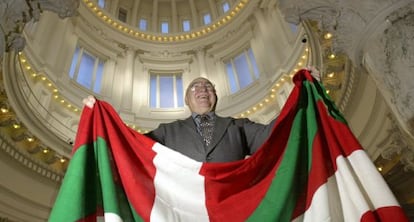Pete Cenarrusa, a tenacious leader of the US Basque lobby, dies at 95
The former cattle baron served for three decades as secretary of state of Idaho

Pete T. Cenarrusa Gardoqui, a US politician of Basque origin who served as secretary of state for Idaho for more than three decades, and was one of the most active Basque community leaders in the United States, died September 29 at his home in Boise following a long battle with cancer. He was 95.
Cenarrusa served for more than 52 years in Idaho public service: nine terms since 1960 in the state House of Representatives — including three stints as House speaker — and as secretary of state from 1967 to 2003 as a Republican. He retired just before turning 85. No other elected representative has served Idaho as long as Cenarrusa, and he is the second longest-serving secretary of state in the nation as a whole.
Cenarrusa’s mother tongue was Basque, and he did not learn English until primary school. In World War II he served in the Marines. After turning to state politics, he often concerned himself with the Basque cause, beginning with the Burgos trial in 1970 of a number of ETA militants. In collaboration with the Democratic US Senator Frank Church of Idaho, he managed to have the White House and the US Secretary of State William P. Rogers intercede on behalf of the Basques facing trial in Spain. After the verdict, in which six of them were sentenced to death, Cenarrusa received a call from the White House informing him that the capital sentences had been commuted.
Cenarrusa and Church tried to have the US government suppress its aid to the Franco regime, and restore democracy in the Basque Country. In 1997, he came to Euskadi as an observer in the first democratic elections.
Cenarrusa led or supported many other initiatives. In 2002, together with the Democrat David Bieter, he succeeded in having the Idaho legislature pass a resolution in favor of self-determination for the Basque Country, which condemned terrorism and called for a peace process with the participation of the Spanish, Basque and French governments.
Although officially retired since 2003, in March of last year he obtained another resolution from Idaho lawmakers applauding the definitive end to ETA’s armed campaign, and calling for a process toward a “lasting peace.” The text was sent to Barack Obama, Mariano Rajoy, Nicolas Sarkozy, then-Basque regional premier Patxi López and Navarre premier Yolanda Barcina.
Cenarrusa, one of the most distinguished members of the Basque diaspora in the Americas, built his fortune on cattle. He pioneered the transporting of cattle to the warmer southwestern US states during the winter calving season, producing important savings in the care of the animals in the severe northwest winters.
Away from politics, he was also noted for his educational work, creating the Cenarrusa Foundation for Basque Culture and the Basque Studies Center at the University of Boise.
Xabier Irujo is co-director of the Basque Studies Center at the University of Nevada in Reno.







































